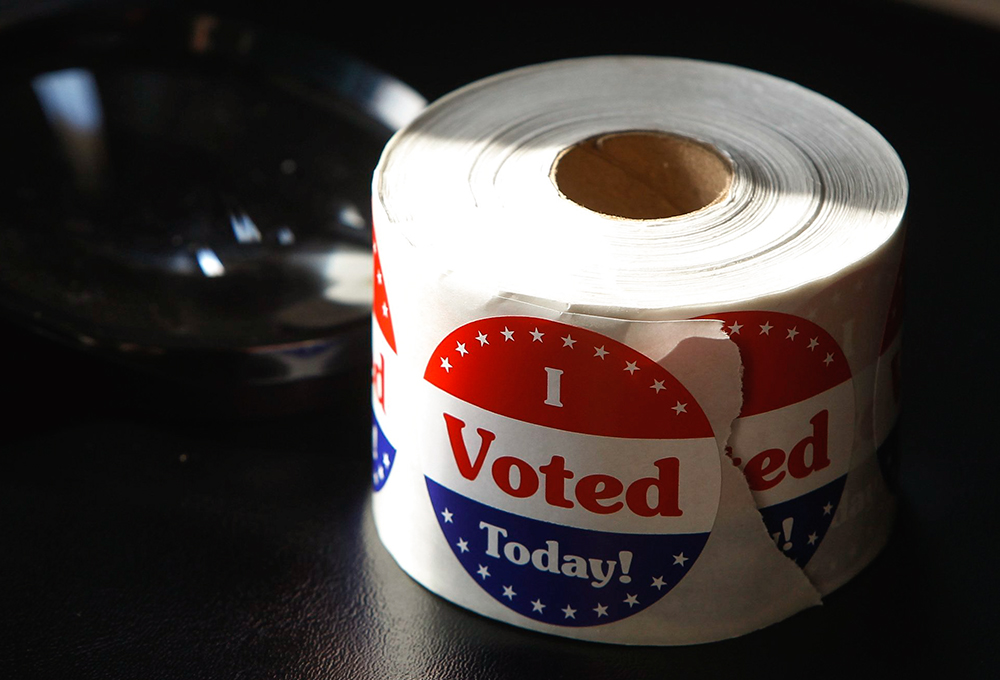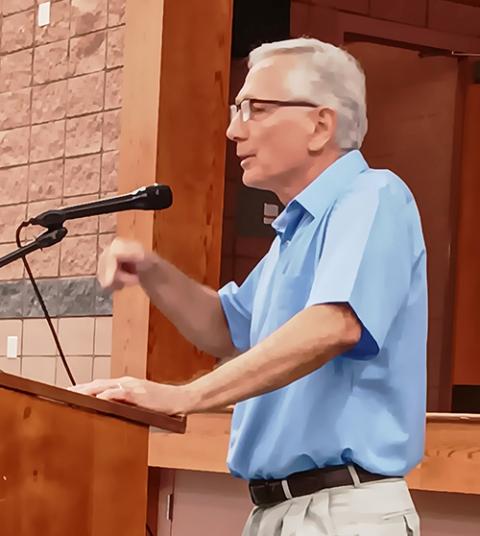
A roll of "I Voted Today" stickers are pictured in a file photo. (OSV News/Reuters/Gary Cameron)
A recent speaker at a South Bend, Indiana, parish said he was not going to tell parishioners how to vote, nor would he present a Catholic report card on the two presidential candidates.
Instead, Gerard Powers, director of Catholic peacebuilding studies at the University of Notre Dame's Kroc Institute for International Peace Studies, said he wanted to offer "some things to consider if we are trying seriously to vote from a Catholic perspective."
Powers, a former director of the U.S. bishops' Office of International Justice and Peace, helped write on international issues in the original version of the bishops' document on the political responsibility of Catholics, "Forming Consciences for Faithful Citizenship." After its first release in 2007, "Faithful Citizenship" has been reissued about every four years just before a presidential election, but it has not been revised since 2019.
He told those gathered at St. Thérèse, Little Flower Parish Oct. 3 that the 2024 election "is very much about the future of democracy," and that the country is "as politically polarized as it has been since the late 1960s."
Powers reminded everyone that Pope Francis has commented on the challenge pro-life Catholics in the U.S. would have in voting in this election. In response to a reporter's question on a papal flight this September, "Pope Francis said Catholics in the United States had to make a conscientious decision and choose the 'lesser of two evils,' citing Harris' support for abortion rights and Trump's anti-immigrant stance," Powers noted.

Gerard Powers, director of Catholic Peacebuilding Studies at Notre Dame's Kroc Institute for International Peace Studies, speaks at St. Thérèse, Little Flower Parish in South Bend, Indiana, Oct. 3. (Catherine M. Odell)
Drawing from the U.S. bishops' document addressing Catholic voters, Powers offered three principles on being a "faithful citizen":
- Citizenship is a virtue and a moral obligation.
- Bringing faith to voting requires a well-formed conscience and prudence.
- There is "no such thing as a Catholic vote" — Catholics can and will disagree on politics.
Powers said the best approach for Catholics preparing to vote is to evaluate their positions in light of Catholic social teaching, but that won't always be easy or simple, he explained. "Politicians expect us to ask ourselves whether the candidate supports our union, business, profession or group. Will she or he cut my taxes?"
Considering candidates or their political positions in light of Catholic social teaching is countercultural, Powers said. He suggested focusing on four specific themes: the dignity of human life, the common good, subsidiarity and solidarity.
Powers made it clear that a focus on the dignity of human life includes objecting to "direct attacks on innocent persons: abortion, euthanasia, human cloning, unjust war and indiscriminate attacks in war." But, he said, it also includes opposing torture, racism and the death penalty, and it includes respect for human dignity and human rights, such as welcoming migrants and finding ways to empower the poor and marginalized.
He said the 1962-65 Second Vatican Council taught the church and world that the common good should be seen as "the sum total of social conditions which allow people, either as groups or as individuals, to reach their fulfillment more fully and more easily," in the words of the council document Gaudium et Spes.
He also said there are conservative Catholics who "claim that the bishops' consistent ethic is too broad and doesn't prioritize the most important issues." They want a simpler, nonnegotiable checklist of what they see as intrinsic evils, such as abortion, euthanasia, fetal stem cell research, human cloning, homosexual marriage, and the denial of religious freedom, he said.
"In Faithful Citizenship," he said, "the bishops do incorporate some of this approach when they make the prudential judgment that 'abortion remains our preeminent priority.' "
Advertisement
As the speaker carefully pointed out, "All issues are not of the same moral significance or the same priority. The right to a just wage is fundamental, but whether the minimum wage should be increased to $15 is not morally comparable to a million abortions per year."
However, Powers explained, that short list of "nonnegotiable" evils that some Catholics prefer to live and vote by tends to ignore or minimize other evils — like racism, genocide or starvation, lying and corruption. He added that it also ignores the unpredictability of brand new threats emerging in our world that attack the dignity of the human person or the common good.
He told his audience that the most important flaw of the "nonnegotiable" approach to voting and political response is that it ignores new existential threats that the world faces today. The bishops' list of issues is somewhat outdated too, he maintained.
Powers said he grew up as a child of Catholic parents in a politically mixed marriage: His father was a Democrat and his Republican mother was the daughter of Italian immigrants who thought that Franklin Delano Roosevelt was a communist.
As the father of five young adults, he said he sees four undeniable existential threats — climate change, nuclear war, another pandemic, and artificial intelligence.
He said he is not a grandfather, but wondered if one day his grandchildren would ask if he "voted in opposition to euthanasia or support for low-income housing. Or will they ask, 'Why didn't you vote for someone who would address the existential threats?'
"Climate change is happening and the whole world is at risk," Powers said. "The risk of nuclear war is greater today than at any time since the Cuban missile crisis. Few voters are paying attention to that. ... Like other nuclear powers, the United States is spending some $1.7 trillion replacing all three legs of the nuclear triad — missiles, bombers, ships."
'The real work of civic participation is not what happens in the voting booth but what we do between elections, whether community service or advocating for policies that are most important to us.'
When he had almost finished his talk, Powers, who said he has spoken about Catholics and elections for the past 30 years, said: "This election is different. ... [It] is very much about the future of democracy. Everything else is secondary."
For him, he said there was now one nonnegotiable in voting for president — "fitness for the office of president."
He said a morally responsible voter should ask if the candidate has the moral character, emotional stability and capacity to deal with the complexities of policy necessary to fulfill his/her duties and if the candidate is committed to upholding our democratic system, respecting the rule of law, committed to political dialogue and compromise when necessary?
He also told the crowd that "the real work of civic participation is not what happens in the voting booth but what we do between elections, whether community service or advocating for policies that are most important to us."
He also warned the audience to be wary of misplaced hope.
"Christian nationalists border on idolatry when they suggest hope lies in electing Trump and that somehow then we would become the Christian nation that God has ordained," Powers said.
"The same could be said for any progressive Christians who put far too much faith in Harris and the Democratic Party," he added.
He said a priest he knows from Burundi has survived genocidal campaigns and lives under constant death threats. But he clings to hope because of his faith.
"If he can maintain hope," Powers said, "how hard can it be for me to do the same, even if my candidate loses, as has so often been the case since I started voting 40 years ago."








